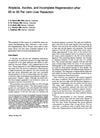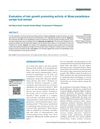 71 citations,
May 1975 in “The American journal of surgery”
71 citations,
May 1975 in “The American journal of surgery” The patient's liver did not fully grow back and she had serious temporary side effects after a very large liver surgery.
 5 citations,
December 2011 in “InTech eBooks”
5 citations,
December 2011 in “InTech eBooks” Eat antioxidant-rich foods, reduce fast food, and explore various treatments for vitiligo.
 11 citations,
March 2007 in “Digestive Diseases and Sciences”
11 citations,
March 2007 in “Digestive Diseases and Sciences” The conditions alopecia areata, primary sclerosing cholangitis, and ulcerative colitis may be linked by shared autoimmune and cell death mechanisms.
 7 citations,
October 2018 in “Dermatology practical & conceptual”
7 citations,
October 2018 in “Dermatology practical & conceptual” Topical oxygen therapy may improve treatments for hair loss, acne, and chronic skin diseases with minimal side effects.
 1 citations,
January 2023 in “IDCases”
1 citations,
January 2023 in “IDCases” A patient experienced severe hair loss after getting an mRNA COVID-19 vaccine.
 12 citations,
February 2014 in “Recent Patents on Inflammation & Allergy Drug Discovery”
12 citations,
February 2014 in “Recent Patents on Inflammation & Allergy Drug Discovery” Shampoos have evolved into multifunctional products with patented innovations for different hair needs and can include medicinal herbs for hair and scalp health.
 January 2023 in “Frontiers in medicine”
January 2023 in “Frontiers in medicine” Early diagnosis and personalized treatments are crucial for better hair loss management.
 9 citations,
December 2017 in “The Journal of Allergy and Clinical Immunology”
9 citations,
December 2017 in “The Journal of Allergy and Clinical Immunology” New targeted therapies for hair loss from alopecia areata show promise, with personalized treatment expected in the future.
15 citations,
October 2013 in “Journal of the American Academy of Dermatology” Vitiligo patients should be routinely screened for thyroid disease and, if extensive or prolonged, also for RA, PA, and type 2 diabetes.
 13 citations,
October 2019 in “Journal of lasers in medical sciences”
13 citations,
October 2019 in “Journal of lasers in medical sciences” CO2 laser treatment for aging skin significantly changes immune system-related genes.
June 2009 in “Mayo Clinic Proceedings” A woman was diagnosed with porphyria cutanea tarda and improved with phlebotomy and lifestyle changes.
 March 2024 in “Dermatology and therapy”
March 2024 in “Dermatology and therapy” AA patients with comorbid conditions face more severe hair loss and need specific treatments.
 July 2023 in “Journal of Indian System of Medicine”
July 2023 in “Journal of Indian System of Medicine” Ayurveda can help treat premature hair graying with lifestyle changes and herbal remedies.
 June 2023 in “Dermatology and therapy”
June 2023 in “Dermatology and therapy” The Middle East and Africa need better data, treatment consensus, and support for Alopecia Areata.
January 2022 in “Skin Appendage Disorders” Areata-like lupus can mimic alopecia areata but is a form of cutaneous lupus erythematosus.
 13 citations,
January 2011 in “Journal of natural pharmaceuticals”
13 citations,
January 2011 in “Journal of natural pharmaceuticals” Unripe banana extract may promote hair growth similar to minoxidil.
 1 citations,
January 2017 in “Springer eBooks”
1 citations,
January 2017 in “Springer eBooks” Understanding the immune-related causes of Alopecia Areata has led to potential treatments like JAK inhibitors.

The vitamin D receptor has many roles in the body beyond managing calcium, affecting the immune system, hair growth, muscles, fat, bone marrow, and cancer cells.
 February 2024 in “Actas dermo-sifiliográficas/Actas dermo-sifiliográficas”
February 2024 in “Actas dermo-sifiliográficas/Actas dermo-sifiliográficas” Most alopecia areata patients in the study were women, aged 15-49, with patchy hair loss and often had other health conditions.
 1 citations,
January 2022 in “Turkiye Klinikleri Journal of Dermatology”
1 citations,
January 2022 in “Turkiye Klinikleri Journal of Dermatology” Lifestyle changes during the early COVID-19 outbreak led to more cases of acne and other skin conditions, but fewer cases of rosacea and skin infections.
 11 citations,
July 2022 in “Frontiers in immunology”
11 citations,
July 2022 in “Frontiers in immunology” Cases of alopecia areata and its impact on life quality rose globally, but when adjusted for age, the rates decreased, especially in poorer regions.
 February 2022 in “Global academic journal of medical sciences”
February 2022 in “Global academic journal of medical sciences” People with alopecia areata have much lower Vitamin-D levels than healthy individuals.
 47 citations,
June 2014 in “Journal of Dermatological Treatment”
47 citations,
June 2014 in “Journal of Dermatological Treatment” Most treatments for lichen planopilaris were found to be generally unsatisfactory.
2 citations,
July 2009 in “Mayo Clinic Proceedings” A 66-year-old woman with skin lesions and other symptoms improved after treatment for porphyria cutanea tarda.
 26 citations,
October 2020 in “Pediatric Dermatology”
26 citations,
October 2020 in “Pediatric Dermatology” Oral tofacitinib may effectively treat hair loss in children with alopecia areata.
 September 2023 in “International journal of medicine”
September 2023 in “International journal of medicine” AI is revolutionizing healthcare by improving diagnosis, treatment, and monitoring, but still needs close supervision.
 January 2025 in “Acta Dermato Venereologica”
January 2025 in “Acta Dermato Venereologica” Mothers with alopecia areata have a higher risk of adverse birth outcomes.
 8 citations,
January 2015 in “World Journal of Gastroenterology”
8 citations,
January 2015 in “World Journal of Gastroenterology” Hair loss is common in IBD patients, and some medications may lower the risk.
 August 2023 in “Physician's journal of medicine”
August 2023 in “Physician's journal of medicine” Hashimoto thyroiditis is an autoimmune disease that can lead to an underactive thyroid and is treated with medication and sometimes diet changes or surgery.
 11 citations,
November 2012 in “Seminars in Cutaneous Medicine and Surgery”
11 citations,
November 2012 in “Seminars in Cutaneous Medicine and Surgery” Genetic factors affect hair loss, and molecular testing may help predict, diagnose, and treat it.


























